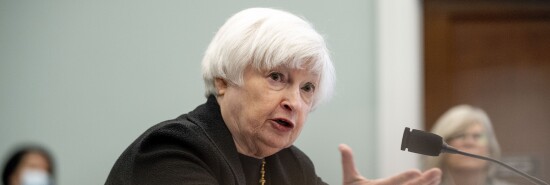
What should taxpayers expect from an enhanced federal revenue machine?
Bruce Yandle
Tax Day is upon us again, and in a celebratory mood at the swearing-in ceremony of new IRS Commissioner Danny Werfel, Treasury Secretary Janet Yellen touted the arrival of a better day for U.S. taxpayers. No, it’s not lower taxes, though that would surely be something to celebrate. It’s about plans to use an additional congressional $80 billion over the next 10 years to fund more effective IRS agents, more audits, and, yes, to raise more tax revenue from the same herd of taxpayers.
Improvements to the IRS are needed, but don’t you think there’s something missing here?
IRS RELEASES $80 BILLION SPENDING PLAN, STRESSING NO INCREASED AUDITS FOR THE MIDDLE CLASS
Yellen’s move to secure more revenues followed her successful leadership in the formation of what is fair to deem as an international minimum corporate tax cartel, an agreement among nations that will reduce firms’ ability to operate where taxes are lowest and perhaps best spent while making it more difficult for America to attract business, jobs, and growth in that manner.
Now, behaving like any other monopolist, Yellen is ready to raise prices (tax rates) and maximize profits (government revenue). Yellen puts it differently, stating that “companies will be incentivized to keep jobs and headquarters at home. And rather than tax havens keeping the profits of U.S. companies, those profits can instead flow back to the United States, allowing us to further invest in our infrastructure, our economy, and our people.” (This, as a side note, assumes the company actually makes the more expensive investment.)
But make no mistake, this is about revenue, and given the secretary’s responsibilities and the huge deficits she must cope with, that’s understandable. Still, it’s a shame that she and her Cabinet colleagues don’t exhibit just as much or more concern over the cost of governing. Why isn’t someone calling for hammering down those costs, finding new and less expensive ways to provide the same (or better) government services? Why is it always about getting more money?
For example, we know that citizens must wait months to get a new passport, that hundreds of thousands of refugees are caught at our borders waiting for asylum petitions to be heard, and that special COVID-inspired food and healthcare subsidies are being phased out. Why not call for a White House task force charged with addressing such problems by making each dollar of federal revenue go a little further and do a little more? Is that so unreasonable when so many are doing the same with their inflation-ravaged budgets?
This is not rocket science, and it can be done in different ways. In 1983, federal agencies were required by the Office of Management and Budget to evaluate functions that could be contracted out and to justify it if they chose to forgo such savings. The program used a process called A-76, developed in 1966 during the Johnson administration. Some agencies got out of the printing business, providing security services, operating cafeterias, and performing certain library functions. More importantly, the requirement caused agency heads to become more cost-conscious than they would have been otherwise.
Yes, we can all agree that those who legitimately owe income taxes should pay and that the IRS should be funded adequately to do its job. But it’s even more important that governments don’t prioritize making life easier for themselves over fiscal competition. Let’s focus on costs as well as revenues. And when it comes to collecting taxes, we must remember that one can sheer a sheep many times but only skin it once.
CLICK HERE TO READ MORE FROM THE WASHINGTON EXAMINER
Bruce Yandle is a distinguished adjunct fellow with the Mercatus Center at George Mason University, dean emeritus of the Clemson College of Business and Behavioral Sciences, and a former executive director with the Federal Trade Commission.
